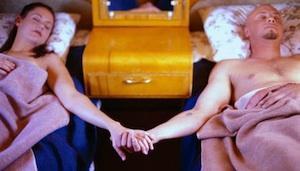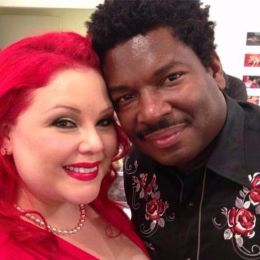Could sleeing in separate beds help your relationship?
Experts say that married couples sleeping in separate beds is more common than you think.
An episode of Good Morning America profiled Arianne and Nate Cohen of Portland, Oregon—a married couple that sleeps in separate rooms. Now, chances are, your first reaction to that scenario is something along the lines of, “well, their marriage is doomed.” But actually, experts say that’s not the case at all—and that the arrangement is way more common than you think.
“I see lots of clients who sleep in separate bedrooms and have better marriages as a result,” confirms Susan Heitler, PhD, a clinical psychologist in Denver, Colorado, author of The Power of Two: Secrets of a Strong and Loving Marriage and founder of the marriage skills website poweroftwomarriage.com. In Arianne and Nate’s case, she likes to read at night while he likes to play guitar, so they use their alone time for their hobbies. The couple said they sleep better and they’ve gotten closer. Here’s why the separate beds thing is more beneficial than you’d think—and how to determine if it could work for you. The first order of business is to understand the primary draw of sleeping apart. The main reason couples do it—and why Heitler says it’s okay—is if they have completely different sleep habits, and those differences are preventing them from getting a good night’s sleep.
Maybe one person snores, for instance, which keeps the other person awake, or maybe one has restless leg syndrome, where they kick in the middle of the night. It could even be a seemingly small thing, like one person prefers to sleep with the hallway light on, whereas the other requires total darkness. Whatever the case may be, the bigger issue is that sleep disturbances due to differences like this can create big relationship problems. “The danger with not sleeping well is that couples often start to resent each other,” Heitler explains. “One partner will start to see the other as a physical manifestation of the fact that they can’t sleep at night, and grow bitter and angry toward them. What’s more, duos often become more irritable and fight over silly things.” When people are well rested, she says, they’re better able to solve problems and approach life with an even temper. And both of these qualities can help improve your relationship. But what about separation anxiety? Or FOMO? Isn’t it bad to not have the opportunity to cuddle and have sex at night? The answer, in short, is no. Think about it: Unless you’re declaring your love for each other in your sleep, all of the good stuff that you associate with sharing a bed—the cuddling, the pillow talk—happens right before you go to sleep and right when you wake up. Heitler’s solution: Develop a morning and nighttime routine so that you can still work those closeness hours in without sacrificing quality sleep. That is, bookend your cuddle time around your actual sleep time. “I know couples who cuddle together in a shared bed at night, or read, or have sex—and then, right when it’s time to go to sleep, they separate, and one goes into the guest room. In the morning, they wake up at the same time, and get back into the same bed to cuddle or be intimate for a bit before going about their days,” Heitler explains. She describes another couple who cuddles on the couch every night before bed, and then splits into their separate bedrooms.
But what about separation anxiety? Or FOMO? Isn’t it bad to not have the opportunity to cuddle and have sex at night? The answer, in short, is no. Think about it: Unless you’re declaring your love for each other in your sleep, all of the good stuff that you associate with sharing a bed—the cuddling, the pillow talk—happens right before you go to sleep and right when you wake up. Heitler’s solution: Develop a morning and nighttime routine so that you can still work those closeness hours in without sacrificing quality sleep. That is, bookend your cuddle time around your actual sleep time. “I know couples who cuddle together in a shared bed at night, or read, or have sex—and then, right when it’s time to go to sleep, they separate, and one goes into the guest room. In the morning, they wake up at the same time, and get back into the same bed to cuddle or be intimate for a bit before going about their days,” Heitler explains. She describes another couple who cuddles on the couch every night before bed, and then splits into their separate bedrooms.
Of course, there are lots of ways to arrange a perfect situation—you and your significant other just need to find the one that works best for both of you. And the best part? Doing so is actually a strong indicator of relationship success. “Couples who are able to figure out a creative solution to their sleeping issues are better off overall,” Heitler says. “That’s because they clearly understand how to voice their concerns and solve them in a realistic and loving way, which is an indicator of a great, equal, and cooperative marriage.” Win-win!
The Separation Exception As with most things in life, there is one caveat. Sleeping separately is only beneficial if it’s really about your sleep quality—not something more. “If you’re splitting up at night because you’re fighting, or because you’re having sex issues, then it’s going to do more harm than good,” says Heitler. In other words, sleeping apart can be great if you’re doing it for the right reasons. But if you’re using it to push a bigger martial issue under the rug, then it will only be a temporary fix and may lead to a bigger blowout down the line. (excerpted from: http://news.health.com/2014/02/05/can-sleeping-apart-help-your-relationship/) Editor's note: Actor Milton Berle kept separate bedrooms for all of his long term marriages. In an LA TImes interview in 1996, he stated: "I've always had my own private bedroom all my life. It's very healthy that way, I think, for both sides, for the man and the woman. I like to cuddle. I like to have love and I have sex and all that, but there are times I believe that it's a better state of mind to have separate bedrooms." In a People Magazine 1982 edition, (while married to second wife Ruth Cosgrove,) he also said: "What makes our home life successful is that she has her way of living and I have mine. We have separate bedrooms, and if she wants to keep the light on to read or open the windows wide, she can. There's no stress at home. We don't fight. We have little disputes about minor things, and we both give in. I don't think a woman should change or a man should change after the wedding ring, and each should be himself or herself. So she has what she wants, and I do too. But in all our years together I've never seen Ruth with cold cream on her face. She's always combed and her face refreshed before we really say good morning. Most of the time I don't see Ruth until she's dressed. I think it all helps keep me feeling young." This picture is Milton with third wife Lorna Adams, whom he married after Ruth passed in 1989, and was married to until he passed in 2002.
Editor's note: Actor Milton Berle kept separate bedrooms for all of his long term marriages. In an LA TImes interview in 1996, he stated: "I've always had my own private bedroom all my life. It's very healthy that way, I think, for both sides, for the man and the woman. I like to cuddle. I like to have love and I have sex and all that, but there are times I believe that it's a better state of mind to have separate bedrooms." In a People Magazine 1982 edition, (while married to second wife Ruth Cosgrove,) he also said: "What makes our home life successful is that she has her way of living and I have mine. We have separate bedrooms, and if she wants to keep the light on to read or open the windows wide, she can. There's no stress at home. We don't fight. We have little disputes about minor things, and we both give in. I don't think a woman should change or a man should change after the wedding ring, and each should be himself or herself. So she has what she wants, and I do too. But in all our years together I've never seen Ruth with cold cream on her face. She's always combed and her face refreshed before we really say good morning. Most of the time I don't see Ruth until she's dressed. I think it all helps keep me feeling young." This picture is Milton with third wife Lorna Adams, whom he married after Ruth passed in 1989, and was married to until he passed in 2002.
Don't forget - check out Dream Pleasure Tours for all of your lifestyle vacation.












































